连淑能《英译汉教程》Translation of Proper Nouns and Technical Terms(专有名词和专门术语译法)
《英译汉教程》(连淑能主编,高等教育出版社)-第10~12章【圣才出品】
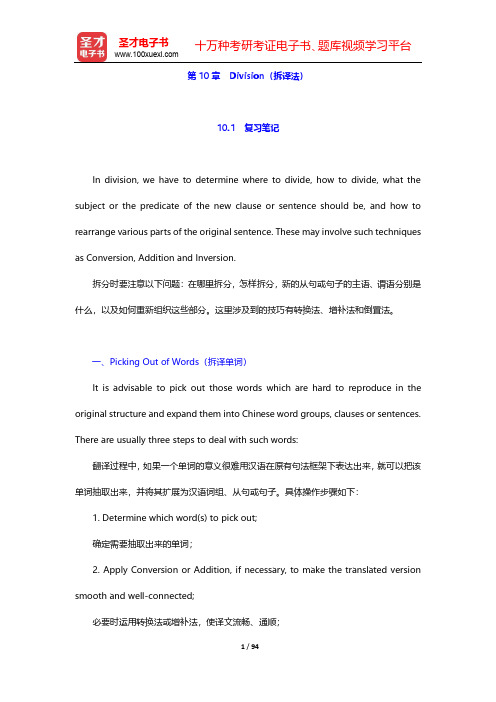
第10章Division(拆译法)10.1 复习笔记In division, we have to determine where to divide, how to divide, what the subject or the predicate of the new clause or sentence should be, and how to rearrange various parts of the original sentence. These may involve such techniques as Conversion, Addition and Inversion.拆分时要注意以下问题:在哪里拆分,怎样拆分,新的从句或句子的主语、谓语分别是什么,以及如何重新组织这些部分。
这里涉及到的技巧有转换法、增补法和倒置法。
一、Picking Out of Words(拆译单词)It is advisable to pick out those words which are hard to reproduce in the original structure and expand them into Chinese word groups, clauses or sentences. There are usually three steps to deal with such words:翻译过程中,如果一个单词的意义很难用汉语在原有句法框架下表达出来,就可以把该单词抽取出来,并将其扩展为汉语词组、从句或句子。
具体操作步骤如下:1. Determine which word(s) to pick out;确定需要抽取出来的单词;2. Apply Conversion or Addition, if necessary, to make the translated version smooth and well-connected;必要时运用转换法或增补法,使译文流畅、通顺;3. Rearrange the word order according to the Chinese mode of expression.根据汉语表达习惯,重新组织语序。
翻译课教学法探索_英译汉教程_教学方法提示
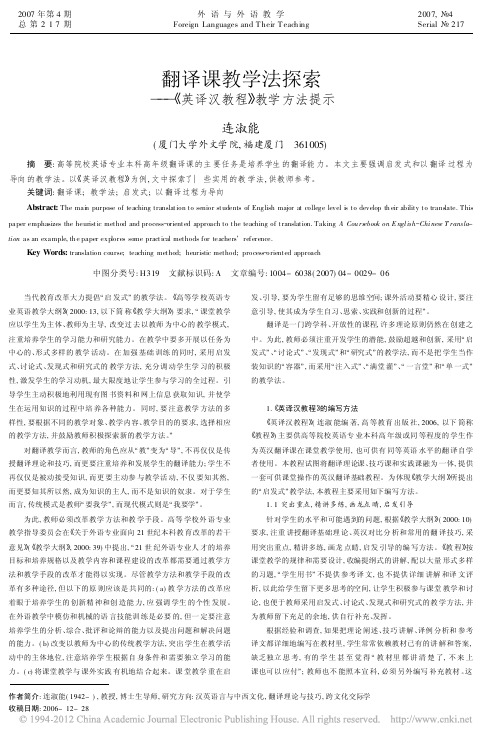
翻译课教学法探索)))5英译汉教程6教学方法提示连淑能(厦门大学外文学院,福建厦门 361005)摘 要:高等院校英语专业本科高年级翻译课的主要任务是培养学生的翻译能力。
本文主要强调启发式和以翻译过程为导向的教学法。
以5英译汉教程6为例,文中探索了一些实用的教学法,供教师参考。
关键词:翻译课;教学法;启发式;以翻译过程为导向Abstract:The mai n purpose of teaching translation to senior students of English major at college level i s to develop th eir ability to trans late.Thispaper emphasizes the heuristic method and process O oriented approach to the teaching of translation.Taking A Cou rsebook on E nglish O Chinese T ransla-tion as an example,th e paper explores some practical methods for teachers .reference.Key Words:translation course;teaching method;heuristic method;process O oriented approach中图分类号:H319 文献标识码:A 文章编号:1004-6038(2007)04-0029-06当代教育改革大力提倡/启发式0的教学法。
5高等学校英语专业英语教学大纲6(2000:13,以下简称5教学大纲6)要求,/课堂教学应以学生为主体、教师为主导,改变过去以教师为中心的教学模式,注重培养学生的学习能力和研究能力。
在教学中要多开展以任务为中心的、形式多样的教学活动。
连淑能《英译汉教程》TranslationofLongSentences(长句译法)【圣才出品】
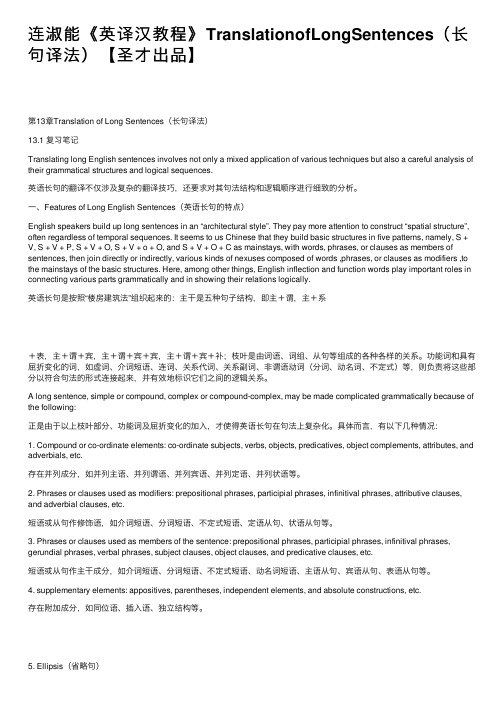
连淑能《英译汉教程》TranslationofLongSentences(长句译法)【圣才出品】第13章Translation of Long Sentences(长句译法)13.1 复习笔记Translating long English sentences involves not only a mixed application of various techniques but also a careful analysis of their grammatical structures and logical sequences.英语长句的翻译不仅涉及复杂的翻译技巧,还要求对其句法结构和逻辑顺序进⾏细致的分析。
⼀、Features of Long English Sentences(英语长句的特点)English speakers build up long sentences in an “architectural style”. They pay more attention to construct “spatial structure”, often regardless of temporal sequences. It seems to us Chinese that they build basic structures in five patterns, namely, S + V, S + V + P, S + V + O, S + V + o + O, and S + V + O + C as mainstays, with words, phrases, or clauses as members of sentences, then join directly or indirectly, various kinds of nexuses composed of words ,phrases, or clauses as modifiers ,to the mainstays of the basic structures. Here, among other things, English inflection and function words play important roles in connecting various parts grammatically and in showing their relations logically.英语长句是按照“楼房建筑法”组织起来的:主⼲是五种句⼦结构,即主+谓,主+系+表,主+谓+宾,主+谓+宾+宾,主+谓+宾+补;枝叶是由词语、词组、从句等组成的各种各样的关系。
连淑能《英译汉教程》配套题库(含考研真题)-Chapter 3~Chapter 4【圣才出品】
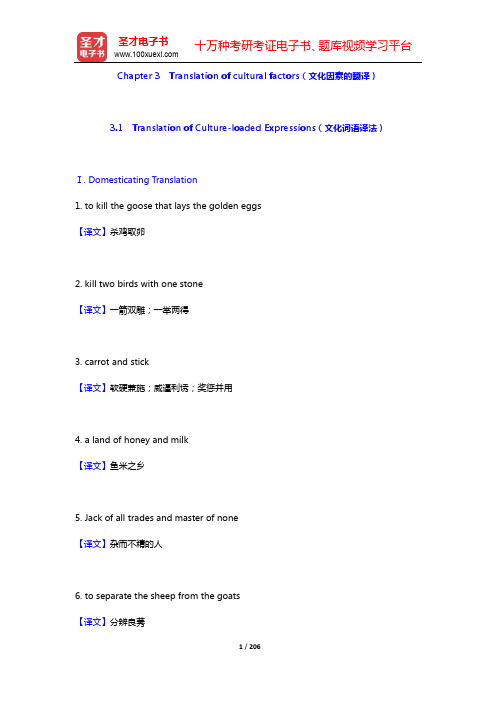
Chapter 3 Translation of cultural factors(文化因素的翻译)3.1 Translation of Culture-loaded Expressions(文化词语译法)Ⅰ. Domesticating Translation1. to kill the goose that lays the golden eggs【译文】杀鸡取卵2. kill two birds with one stone【译文】一箭双雕;一举两得3. carrot and stick【译文】软硬兼施;威逼利诱;奖惩并用4. a land of honey and milk【译文】鱼米之乡5. Jack of all trades and master of none【译文】杂而不精的人6. to separate the sheep from the goats【译文】分辨良莠7. to take French leave【译文】不告而别8. to carry coals to Newcastle【译文】多此一举【解析】纽卡斯尔是英国煤炭重镇,故往纽卡斯尔运煤是多此一举。
9. to paint the lily【译文】画蛇添足10. to face the music【译文】临危不惧11. to mind one’s P’s and Q’s【译文】谨言慎行12. to put the cart before the horse【译文】本末倒置13. to laugh off one’s head【译文】笑掉大牙14. as timid as a rabbit【译文】胆小如鼠15. as mute as a fish【译文】噤若寒蝉16. neither fish nor flesh【译文】不伦不类17. six of one and half a dozen of the other【译文】半斤八两18. to spend money like water【译文】挥金如土19. to look for a needle in haystack【译文】大海捞针20. Better be the head of a dog than the tail of a lion. 【译文】宁为鸡头,不为凤尾。
英译汉教程连淑能配套练习题库

英译汉教程连淑能配套练习题库|才聪学习网连淑能《英译汉教程》配套题库(含考研真题)目录Chapter 1 Lexical Translation(词法翻译)1.1 Diction(选词法)1.2 Conversion(转换法)1.3 Addition(增补法)1.4 Omission(省略法)1.5 Repetition(重复法)Chapter 2 Syntactical Translation(句法翻译)2.1 Inversion(倒置法)2.2 Negation(反译法)2.3 Division(拆译法)2.4 Condensation(缩译法)2.5 Translation of the Passive(被动句的译法)2.6 Translation of Long Sentences(长句译法)Chapter 3 Translation of cultural factors(文化因素的翻译)3.1 Translation of Culture-loaded Expressions(文化词语译法)3.2 Translation of Proper Nouns and Technical Terms(专有名词和专门术语译法)Chapter 4 Style and Translation(文体与翻译)4.1 Political Writing(政治文体)4.2 Journalistic Writings(新闻报刊文体)4.3 Popular Science Writing(科普文体)4.4 Practical Writing(应用文体)4.5 Literary Style(文学文体)•试看部分内容Chapter 1Lexi cal Transla tion(词法翻译)1.1 Diction(选词法)Ⅰ. Choice of Affective Meanings1. In ou r Se con d Addre ss on the war, fi ve days af te rt h e a d v e n t o f th o s e m e n,w e to l d y o u w h a t th e y w e r e.【译文】在这伙人上台五天以后,我们在关于前次战争的第二篇宣言中已经向你们说明他们究竟是些什么货色了。
chapter 5 addition Microsoft PowerPoint 连淑能《英译汉教程
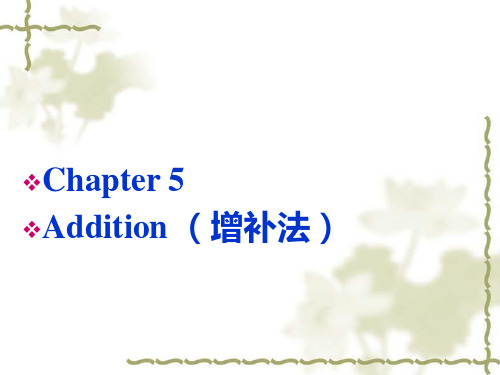
❖ I. Please give the Chinese or English equivalents for the following terms. (1 point for each, 10 points in all)
❖ II. Fill in the following blanks with proper words. (1 point for each blank, 15 points in all)
❖Addition means supplying necessary words in translation, making the version grammatically correct, semantically clear, rhetorically sound, logically acceptable, and culturally appropriate.
v i
❖ Chou was a quiet and thoughtful man, even a little shy as he welcomed his visitors, urged them to be seated and to tell how he could help them.
—The Great Road — the Life and Times of Chu Teh
❖ “美国进步作家和中国人民 的朋友”—郭沫若
❖ 埃德加·斯诺(Edgar Snow 1905~1972)
❖ “中国人民的美国朋友 埃德加·斯诺之墓”—叶 剑英
❖ 《红星照耀中国 》 (《西行漫记》Red Star Over China)
❖ More examples:
《英译汉教程》(连淑能主编,高等教育出版社)-第4~6章【圣才出品】
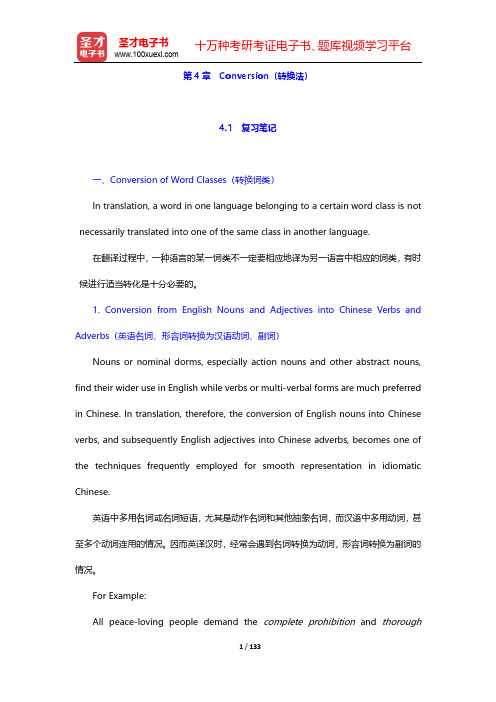
第4章Conversion(转换法)4.1 复习笔记一、Conversion of Word Classes(转换词类)In translation, a word in one language belonging to a certain word class is not necessarily translated into one of the same class in another language.在翻译过程中,一种语言的某一词类不一定要相应地译为另一语言中相应的词类,有时候进行适当转化是十分必要的。
1. Conversion from English Nouns and Adjectives into Chinese Verbs and Adverbs(英语名词、形容词转换为汉语动词、副词)Nouns or nominal dorms, especially action nouns and other abstract nouns, find their wider use in English while verbs or multi-verbal forms are much preferred in Chinese. In translation, therefore, the conversion of English nouns into Chinese verbs, and subsequently English adjectives into Chinese adverbs, becomes one of the techniques frequently employed for smooth representation in idiomatic Chinese.英语中多用名词或名词短语,尤其是动作名词和其他抽象名词,而汉语中多用动词,甚至多个动词连用的情况。
chapter 1 general principles 连淑能《英译汉教程》(课堂PPT)

.
15
❖翻译是把第一种语言(源语)语篇 所表达的东西用第二种语言(目的 语)重新表达出来,尽量保持语义 与文体方面的等值。
.
16
❖ Translation may be defined as the replacement of textual material in one language (the source language) by equivalent textual material in another language (the target language).
Chapter 1 General Principles
❖ The Definitions of Translation
❖ The Categories of Trቤተ መጻሕፍቲ ባይዱnslation
❖ The Assessment of Translation
❖ The Competence of A Translator
❖ Translation Strategies
❖ Translation Processes
.
1
❖ 译即易,谓换易言语使相解也。 ——唐·贾公彦:《义疏》
❖ 把已说出或写出的话的意思用另一种语 言表达出来的活动。
——《中国大百科全书·语言文字卷》
.
2
❖ 翻译的实质是语际的意义转换。 ——刘宓庆
—Nida & Taber. The Theory and Practice of Translation
.
10
❖ 翻译就是在译入语中再现与原语的信息 最切近的自然对等物,首先是就意义而 言,其次是就文体而言。 ——奈达
.
哈尔滨师范大学英语翻译硕士考研参考书目及其解析,百科知识精编笔记及其真题解析
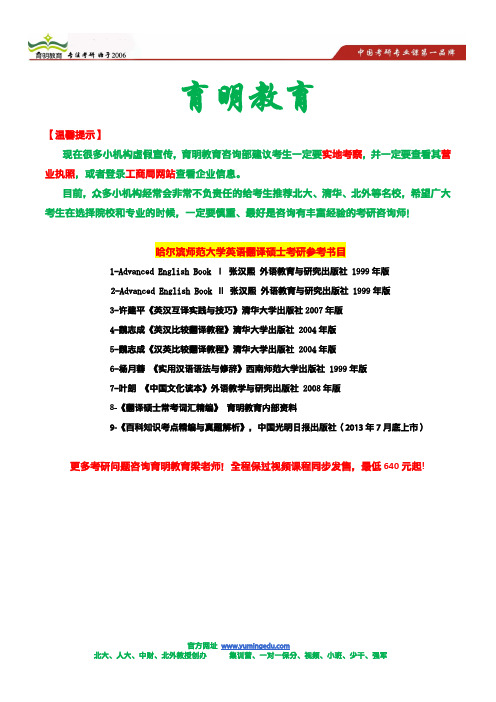
育明教育
【温馨提示】
现在很多小机构虚假宣传,育明教育咨询部建议考生一定要实地考察,并一定要查看其营业执照,或者登录工商局网站查看企业信息。
目前,众多小机构经常会非常不负责任的给考生推荐北大、清华、北外等名校,希望广大考生在选择院校和专业的时候,一定要慎重、最好是咨询有丰富经验的考研咨询师!
哈尔滨师范大学英语翻译硕士考研参考书目
1-Advanced English Book Ⅰ张汉熙外语教育与研究出版社 1999年版
2-Advanced English Book Ⅱ张汉熙外语教育与研究出版社 1999年版
3-许建平《英汉互译实践与技巧》清华大学出版社2007年版
4-魏志成《英汉比较翻译教程》清华大学出版社 2004年版
5-魏志成《汉英比较翻译教程》清华大学出版社 2004年版
6-杨月蓉《实用汉语语法与修辞》西南师范大学出版社 1999年版
7-叶朗《中国文化读本》外语教学与研究出版社 2008年版
8-《翻译硕士常考词汇精编》育明教育内部资料
9-《百科知识考点精编与真题解析》,中国光明日报出版社(2013年7月底上市)
更多考研问题咨询育明教育梁老师!全程保过视频课程同步发售,最低640元起!。
2015年对外经济贸易大学翻译硕士会议口译考研真题,考研难度
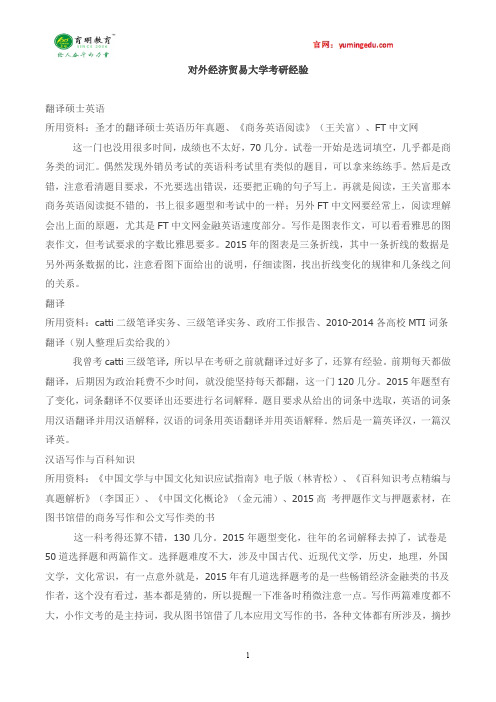
对外经济贸易大学考研经验翻译硕士英语所用资料:圣才的翻译硕士英语历年真题、《商务英语阅读》(王关富)、FT中文网这一门也没用很多时间,成绩也不太好,70几分。
试卷一开始是选词填空,几乎都是商务类的词汇。
偶然发现外销员考试的英语科考试里有类似的题目,可以拿来练练手。
然后是改错,注意看清题目要求,不光要选出错误,还要把正确的句子写上。
再就是阅读,王关富那本商务英语阅读挺不错的,书上很多题型和考试中的一样;另外FT中文网要经常上,阅读理解会出上面的原题,尤其是FT中文网金融英语速度部分。
写作是图表作文,可以看看雅思的图表作文,但考试要求的字数比雅思要多。
2015年的图表是三条折线,其中一条折线的数据是另外两条数据的比,注意看图下面给出的说明,仔细读图,找出折线变化的规律和几条线之间的关系。
翻译所用资料:catti二级笔译实务、三级笔译实务、政府工作报告、2010-2014各高校MTI词条翻译(别人整理后卖给我的)我曾考catti三级笔译,所以早在考研之前就翻译过好多了,还算有经验。
前期每天都做翻译,后期因为政治耗费不少时间,就没能坚持每天都翻,这一门120几分。
2015年题型有了变化,词条翻译不仅要译出还要进行名词解释。
题目要求从给出的词条中选取,英语的词条用汉语翻译并用汉语解释,汉语的词条用英语翻译并用英语解释。
然后是一篇英译汉,一篇汉译英。
汉语写作与百科知识所用资料:《中国文学与中国文化知识应试指南》电子版(林青松)、《百科知识考点精编与真题解析》(李国正)、《中国文化概论》(金元浦)、2015高考押题作文与押题素材,在图书馆借的商务写作和公文写作类的书这一科考得还算不错,130几分。
2015年题型变化,往年的名词解释去掉了,试卷是50道选择题和两篇作文。
选择题难度不大,涉及中国古代、近现代文学,历史,地理,外国文学,文化常识,有一点意外就是,2015年有几道选择题考的是一些畅销经济金融类的书及作者,这个没有看过,基本都是猜的,所以提醒一下准备时稍微注意一点。
连淑能《英译汉教程》Conversion(转换法)【圣才出品】
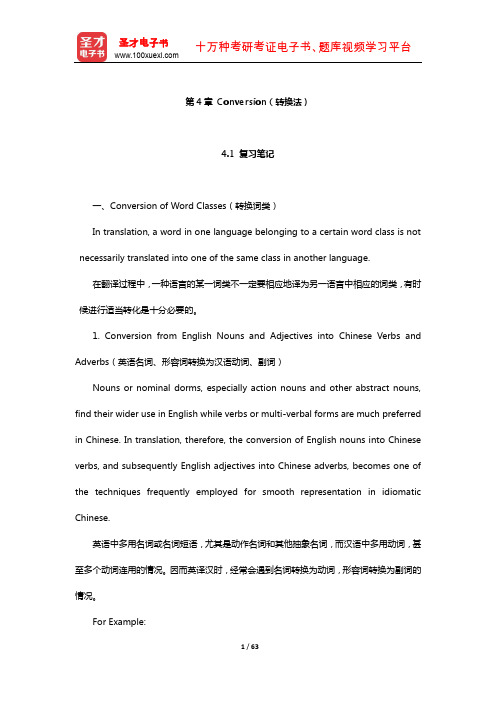
第4章Conversion(转换法)4.1 复习笔记一、Conversion of Word Classes(转换词类)In translation, a word in one language belonging to a certain word class is not necessarily translated into one of the same class in another language.在翻译过程中,一种语言的某一词类不一定要相应地译为另一语言中相应的词类,有时候进行适当转化是十分必要的。
1. Conversion from English Nouns and Adjectives into Chinese Verbs and Adverbs(英语名词、形容词转换为汉语动词、副词)Nouns or nominal dorms, especially action nouns and other abstract nouns, find their wider use in English while verbs or multi-verbal forms are much preferred in Chinese. In translation, therefore, the conversion of English nouns into Chinese verbs, and subsequently English adjectives into Chinese adverbs, becomes one of the techniques frequently employed for smooth representation in idiomatic Chinese.英语中多用名词或名词短语,尤其是动作名词和其他抽象名词,而汉语中多用动词,甚至多个动词连用的情况。
《英译汉教程》(连淑能主编,高等教育出版社)-第1~3章【圣才出品】

第1章General Principles(概论)1.1 复习笔记一、Definitions of Translation(翻译的定义)Translation can be roughly defined as a reproduction or recreation in one language of what is written or said in another language.翻译即用一种语言来再现另一种口头或书面的语言文本所传达的意义。
1. Linguistic Views on Translation(语言学视角)Translating consists in reproducing in the receptor language the closest natural equivalent of the source-language message, first in terms of meaning and secondly in terms of style. (Nida & Taber, 1969:12)翻译就是在译语中用最贴切而又最自然的对等语再现原语的信息,首先是语义,其次是文体。
2. Cultural Views on Translation(文化视角)翻译不仅涉及语言问题,也涉及文化问题。
译者不仅要了解外国的文化,还要深入了解自己民族的文化。
(王佐良,1989)Translation is a process which occurs between cultures rather than simply between languages. (Shuttleworth & Cowie, 1997:35)翻译是一个发生在不同文化之间的过程,而不仅仅是语言之间的过程。
3. Literary Views on Translation(文学视角)文学翻译的任务是要把原作中包含的一定社会生活的影响完好无损地从一种语言移注到另一种语言中。
连淑能《英译汉教程》Translation of Long Sentences(长句译法)【圣才出品】
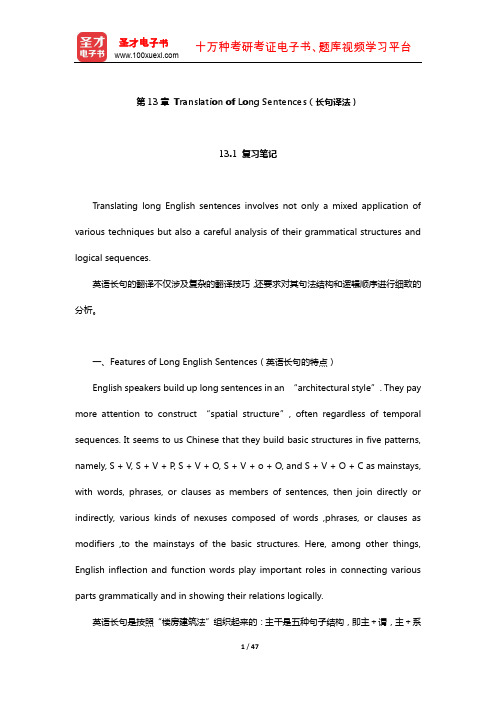
存在并列成分,如并列主语、并列谓语、并列宾语、并列定语、并列状语等。 2. Phrases or clauses used as modifiers: prepositional phrases, participial phrases, infinitival phrases, attributive clauses, and adverbial clauses, etc. 短语或从句作修饰语,如介词短语、分词短语、不定式短语、定语从句、状语从句等。 3. Phrases or clauses used as members of the sentence: prepositional phrases, participial phrases, infinitival phrases, gerundial phrases, verbal phrases, subject clauses, object clauses, and predicative clauses, etc. 短语或从句作主干成分,如介词短语、分词短语、不定式短语、动名词短语、主语从句、 宾语从句、表语从句等。 4. supplementary elements: appositives, parentheses, independent elements, and absolute constructions, etc. 存在附加成分,如同位语、插入语、独立结构等。
圣才电子书 十万种考研考证电子书、题库视频学习平台
generalrinciples连淑能《英译汉教程》

❖ “翻译,的确可以帮助我们造出许多新的 字眼,新的句法,丰富的词汇和细腻的 精密的正确的表现。因此,我们既然进 行着创造中国现代的新的言语的斗争, 我们对于翻译,就不能够不要求:绝对 的正确和绝对的中国白话文。”
❖opens a new era for modern translation studies.
❖ 鲁迅&瞿秋白 vs. 赵景深
❖ dichotomy between “faithfulness” and “smoothness”
❖ The focus of the debate was which principle should take priority in translating.
❖Function of the three-character principle by Yan Fu
❖a milestone in China’s translation history
❖extracts the essence from Buddhist translation studies of the Han and Tang Dynasties;
1. languages involved
translation from native language into a foreign language and vice versa.
2. working style oral translation/ interpreting 口译
(consecutive interpreting CI交替传译; simultaneous interpreting SI同声传译 ) ;
Chapter 1 General Principles
连淑能 2006 英译汉教程

连淑能 2006 英译汉教程《以连淑能2006英译汉教程》第一章:介绍在这个教程中,我们将学习如何将以连淑能2006这本英文书籍翻译成汉语。
该书以教授英译汉技巧为主题,旨在帮助读者提高翻译能力。
本教程将以人类视角展开叙述,为读者提供一种仿佛真人辅导的感觉。
第二章:理解原文在开始翻译之前,我们需要对原文进行深入理解。
通过仔细阅读以连淑能2006这本书籍,我们可以了解其中的主要观点和论述。
为了避免误导和歧义,我们必须确保对原文的理解准确无误。
第三章:翻译技巧在翻译过程中,我们将运用一些翻译技巧来保持原文的意思和风格。
这些技巧包括准确表达、适当运用词汇和语法结构等。
我们将避免使用数学公式或计算公式,以确保文章的易读性。
第四章:结构和流畅度为了使翻译后的文章流畅易读,我们需要合理安排文章的结构和段落。
使用适当的标题可以帮助读者更好地理解文章的内容。
此外,我们还会使用丰富多样的词汇来表达,以增加文章的表现力。
第五章:注意事项在翻译过程中,我们需要注意一些细节,以确保文章的准确性和质量。
避免在文章中插入任何网络地址,以防止读者分心。
同时,我们也要避免使用依赖图像的语句,以免给读者造成困惑。
第六章:总结通过本教程的学习,我们将能够提高英译汉的技巧,更好地理解和翻译以连淑能2006这本书籍。
我们将以人类的视角进行写作,使文章富有情感,并使读者感到仿佛是真人在叙述。
同时,我们也会注重文章的自然度和流畅度,避免给人机器生成的感觉。
希望通过这个教程,读者们能够在英译汉的道路上更进一步,取得更好的成果。
祝愿大家在翻译的旅程中,越走越远,越来越好!。
英译汉教程第一章练习答案连淑能
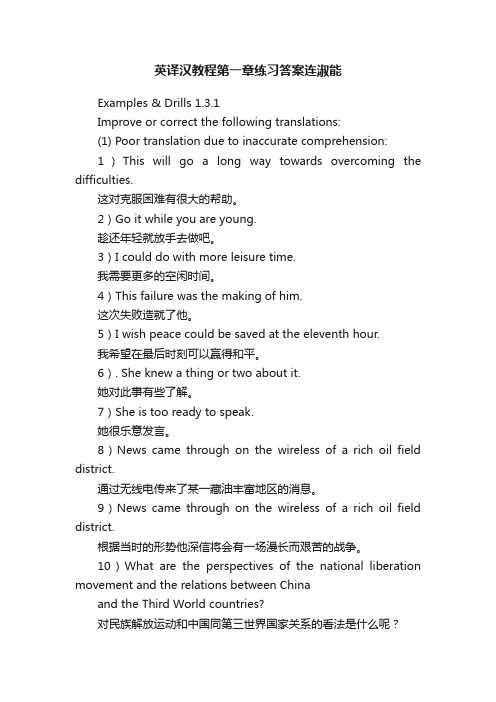
英译汉教程第一章练习答案连淑能Examples & Drills 1.3.1Improve or correct the following translations:(1) Poor translation due to inaccurate comprehension:1)This will go a long way towards overcoming the difficulties.这对克服困难有很大的帮助。
2)Go it while you are young.趁还年轻就放手去做吧。
3)I could do with more leisure time.我需要更多的空闲时间。
4)This failure was the making of him.这次失败造就了他。
5)I wish peace could be saved at the eleventh hour.我希望在最后时刻可以赢得和平。
6). She knew a thing or two about it.她对此事有些了解。
7)She is too ready to speak.她很乐意发言。
8)News came through on the wireless of a rich oil field district.通过无线电传来了某一藏油丰富地区的消息。
9)News came through on the wireless of a rich oil field district.根据当时的形势他深信将会有一场漫长而艰苦的战争。
10)What are the perspectives of the national liberation movement and the relations between Chinaand the Third World countries?对民族解放运动和中国同第三世界国家关系的看法是什么呢?(2) Poor translation due to inappropriate representation:1)This is a 100-hour reliable engine.这台发动机可以连续运转100个小时,非常可靠。
chaptergeneralrinciples连淑能英译汉教程

?4. translation materials ? general translation ? specialized-subject translation ? literary translation, etc.
?“文、质”之争
?the conflict between “ornament” and “substance”
? Translating is the art of recomposing a work in another language without losing its original flavor. —Columbia Encyclopedia
? Translating consists in reproducing in the receptor language the closest natural equivalent of the source language message, first in terms of meaning, and secondly in terms of style.
? The Book of Changessays that the purpose of rhetoric is to ensure truthfulness. Confucius says that expressiveness is all that matters in writing. He also says that writings without elegance do not last. These three principles point to good writing and should be observed as the codes of practice of translation. So, apart from faithfulness and expressiveness, elegance is also to be aimed at.
翻译转移理论视角下的英汉翻译研究——以连淑能《英译汉教程》的
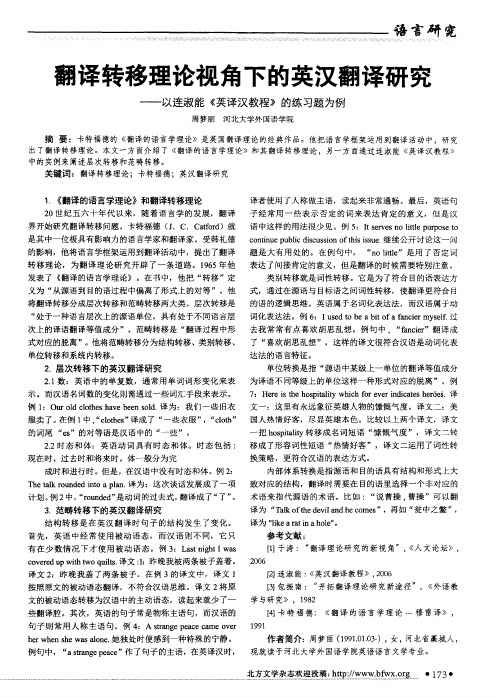
2 . 1 数 :英 语 中 的单 复数 ,通 常 用单 词词 形 变化 来 表 为 译语 不 同等 级上 的单 位这样 一 种形 式对应 的脱 离 ”。例
例 l :O u r o l d c l o t h e s h a v e b e e n s o l d . 译 为 :我们 一 些 旧衣 文 一 :这里有 永远 象征 英雄 人物 的慷 慨气度 。译 文二 :美
换 策略 ,更符 合汉 语 的表 达方 式 。 内部体 系转 换是 指源 语和 目的语 具有 结构和 形式 上大 术语 来 指代 源语 的术语 。 比如 :“ 说 曹操 , 曹操 ”可 以翻
译为 “ T a l k o f h t e d e v i l nd a h e c o me s ”,再如 “ 瓮 中之鳖 ”,
服 卖 了。 在例 1 中, “ c l o t h e s ” 译成了 “ 一些 衣服 ”,“ c l o h” t 国人热 情好 客 ,尽 显 英雄本 色 。比较 以上 两个译 文 ,译文
的词尾 “ e s ”的对等 语是汉 语 中的 “ 一 些 ”。 现 在时 、过 去时和 将来 时。体 一般分 为完
单 位转 换是 指 “ 源 语 中某级 上一 单位 的翻译 等值 成分
7 : He r e i s t h e h o s p i t a l i t y wh i c h f o r e v e r i n d i c a t e s h e r 6 e  ̄ .译
例句中fancier翻译成了喜欢胡思乱想这样的译文很符合汉语是动词化表达法的语言特单位转换是指源语中某级上一单位的翻译等值成分为译语不同等级上的单位这样一种形式对应的脱离
—
—
语 言 研 究
- 1、下载文档前请自行甄别文档内容的完整性,平台不提供额外的编辑、内容补充、找答案等附加服务。
- 2、"仅部分预览"的文档,不可在线预览部分如存在完整性等问题,可反馈申请退款(可完整预览的文档不适用该条件!)。
- 3、如文档侵犯您的权益,请联系客服反馈,我们会尽快为您处理(人工客服工作时间:9:00-18:30)。
第15章Translation of Proper Nouns and Technical Terms(专有名词和专门术语译法)15.1 复习笔记English proper nouns include names of persons, places, organizations ,newspapers, periodicals, radios, news agencies, books, films, etc. English technical terms include, broadly speaking, special words or expressions for things and ideas used in any branch of science and technology.英语专有名词包括人名、地名、组织名、报纸名、期刊名、广播台名、通讯社名、书名、电影名等等。
英语专有术语主要包括在技术科学、社会科学、自然科学等领域广泛运用的特殊词汇或特殊表达。
Many troubles arise in translating proper names and technical terms. Great confusion may come from.在翻译专有名词和专有术语的时候会遇到一些棘手的问题,这些问题主要来源于:1. Transliteration of proper names from English spelling or pronunciation;对英语专有名词的发音直接进行音译;2. Variation in the spoken sound of Chinese characters used in translated names;汉语中部分汉字的发音有地域区别;3. Large number of homonyms, homophones and homographs in Chinese;汉语中有大量同音字、多音字和同形字;4. Mixed use of old and new translated names.新译法和旧译法的混合使用。
一、Transliteration(音译)Proper nouns such as the names of persons and places of foreign countries are, as a rule , to be transliterated, i.e., to be translated by using Chinese characters to represent the sound in articulating these names.通常情况下,外国的人名、地名等专有名词都采用音译的方法,即运用汉字的发音来代替原发音。
1. Follow the Original Pronunciation of Proper Names(名从主人)Generally speaking, proper names should be transliterated directly from their original languages. this explains why some proper names are not transliterated from their English pronunciation. For example:一般说来,专有名词应该根据原语言的发音来进行音译,所以有些词并不是根据其英文发音,而是根据其原发音来音译的。
例如:Paris (French) 巴黎(not transliterated from English as “帕里斯”)Rome (Italian: Roma) 罗马(not transliterated from English as “罗姆”)Germany (German: Deutsch) 德意志(not “哲默尼”as from English)Some proper names, however, are transliterated from their English pronunciations. For example:但是,还有些词是根据其英文发音来音译的。
例如:Moscow 莫斯科(not from Russian “Moskva”)Warsaw 华沙(not from Polish “Warszawa”)Prague 布拉格(not from Czechoslovakian “Praha”)Many Japanese names are transliterated into English according to the Japanese pronunciation of the Chinese characters and are therefore quite different from what they ought to be in our pronunciation. In translation, Chinese characters “borrowed”by the Japanese should be “returned”to their original owner—Chinese.许多日文名词是根据日文汉字的发音被音译成英文的,因而英文发音就不同于这些汉字本应有的汉语发音。
在将其译成中文时,要将这些被日语借用的汉字的发音还原为汉语发音。
Tokyo 东京Nagasaki 长崎Yokohama 横滨Hatoyama 鸠山Hiroshima 广岛Emiko 惠美子The Chinese names of persons and places translated into English before January 1st, 1979 according to the Wade system, local dialects, or something else should be transliterated in line with the rules announced by China’s State Council. Translations like the following are not in use, though they sometimes can be foundin foot-notes or foreign publications.在1979年1月1日之前,采用威妥玛式拼法、本地方言或其他方式翻译的中国人名、地名,应严格根据国务院颁布的条例做出修正。
以下几种译法虽然有时会出现在脚注或外文出版物中,但它们是不能通用的。
北京Peking厦门Amoy汕头Swatow烟台Chefoo沈阳Mukden张家口Kalgan哈尔滨Harbin广州Canton大连Dairen旅顺Port Arthur日喀则Shigatse松花江Sungari R.金门Quemoy马祖Matsu佛山Fatshan黄浦江Whangpoo R.珠穆朗玛峰Mount Everest罗布泊Lop Nor/Lob Nor南沙群岛Spratly Is.西沙群岛Paracels Is.2. Use the Standard Pronunciation of the Chinese Character(运用汉字的标准读音)Due to the lack of many foreign sounds in Chinese, and the variation in the pronunciation of the Chinese character causing confusion, the remedy is to fix certain Chinese character(s) for a certain syllable of foreign names. This work has been done by the Xinhua News Agency, whose Table on E-C Transliteration is shown in Appendix.在将外文名字译成汉字时,存在一个困难,即很多外语发音缺少对应的汉语发音,而且汉语发音存在地域差异。
解决这一问题的方法是:选定某(几)个汉字来对应外语的一个音节。
新华社已经总结出一套英汉对应的译音[英汉译音表(Table on E-C Transliteration)),收录在附录中]。
In using or choosing Chinese characters for foreign names, the following seven rules should be observed:在选择与英文名字对应的汉字时,要注意以下几个方面:(1)Avoid making transliterated name too long, This may be done by omitting some unclear or unimportant sounds;不要把名字译得太长,可以适当省略不清楚或不重要的发音;Roosevelt 罗斯福(not罗斯福尔特)Engels 恩格斯(not恩格尔斯)Elizabeth 伊丽莎白(not伊丽莎白丝)Portland 波特兰(not波特兰德)Sierra Leone 塞拉利昂(not塞拉勒窝内,jokingly as“塞到鸡窝内”)(2)Avoid the use of rare, obsolete and abstruse characters;忌用罕见古奥汉字,应用“特”而不用“忒”,用“伊”而不用“彝”,等等;(3)Avoid the characters that may be misunderstood in the context忌用容易造成歧义的汉字;Vyshinsky 维辛斯基(not维新斯基)Hooker 胡克(not虎渴)jeep 吉普(not鸡脯)(4)Avoid the use of characters or words with a derogatory or commendatory implication;忌用有含有褒贬倾向的汉字。
如:丑、恶、鬼、狐、悲、匪、尸、妖等;Bumble 本伯(not笨伯)Congo 刚果(not甘果)Mozambique 莫桑比克(not莫三别给、莫三鼻给)phantom circuit 幻象电路(not鬼魂电路)AIDS virus 艾滋病病毒(not爱滋病病毒)(5)Avoid the use of Chinese surnames for foreigners’(with many exceptions);忌用汉语名字绰号来翻译外文名字(但有很多例外);Gogol 果戈理(not郭哥儿)Tolstoy 托尔斯泰(not陶师道)。
